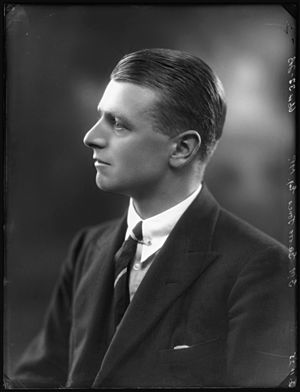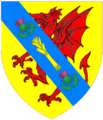George Trefgarne, 1st Baron Trefgarne facts for kids
Quick facts for kids
The Lord Trefgarne
|
|
|---|---|
 |
|
| Member of the House of Lords Lord Temporal |
|
| In office 21 January 1947 – 27 September 1960 Hereditary peerage |
|
| Preceded by | Peerage created |
| Succeeded by | The 2nd Baron Trefgarne |
| Member of Parliament for Aberdeen North |
|
| In office 14 November 1935 – 15 June 1945 |
|
| Preceded by | John George Burnett |
| Succeeded by | Hector Hughes |
| Member of Parliament for Hackney South |
|
| In office 29 October 1924 – 10 May 1929 |
|
| Preceded by | Herbert Morrison |
| Succeeded by | Herbert Morrison |
| Personal details | |
| Born |
George Garro-Jones
14 September 1894 Haverfordwest, Wales |
| Died | 27 September 1960 (aged 66) |
| Political party | |
| Children | David |
| Occupation |
|
George Morgan Trefgarne, 1st Baron Trefgarne (born George Garro-Jones; 14 September 1894 – 27 September 1960), was a Welsh politician. He was a barrister (a type of lawyer), a businessman, and an editor. He was first a member of the Liberal Party and later joined the Labour Party.
Contents
About George Trefgarne's Early Life
George Garro-Jones was born in Haverfordwest, Wales, on 14 September 1894. His father was a Congregationalist Minister. This means his father was a religious leader in a Christian church. Because of this, George was known as a "child of the Manse." A manse is the house where a minister lives.
His father, Reverend David Garro-Jones, trained at Brecon College. He served in Congregational churches all over Wales. The family's home in Spittal had views of Treffgarne Rocks. This beautiful place is believed to be where the name "Trefgarne" came from when George later became a Lord.
George Trefgarne's Political Journey
George Garro-Jones worked as a private secretary for Sir Hamar Greenwood. This was from 1919 to 1922. Sir Hamar Greenwood was a Liberal Minister in the government at the time. A private secretary helps a busy person with their daily tasks and important papers.
Becoming a Member of Parliament
Because of his work with Sir Hamar Greenwood, George decided to become a politician. He ran as a candidate for the National Liberals in the 1922 general election. A general election is when people vote for who they want to represent them in Parliament.
He tried to win the seat for Bethnal Green North East. However, it was a tough election for him. The political parties that had been working together decided to split up. This meant he faced more opponents. He did not win this election.
After this, the different parts of the Liberal Party came back together. George was chosen to be the Liberal candidate again in the 1923 general election. This time, he ran for the Hackney South seat. He didn't win, but he got more votes than the person who was already the Member of Parliament (MP). An MP is a person elected to represent a group of people in Parliament.
George Garro-Jones didn't have to wait long for another chance. In 1924, he ran for Hackney South again. This time, he won the seat! This was a special victory because many Liberals lost their seats in that election.
Switching Political Parties
George Garro-Jones decided not to run in the 1929 election. Soon after, he joined the Labour Party. He was then elected as a Labour MP for Aberdeen North in the 1935 general election. He held this seat until 1945.
Becoming a Lord
On 21 January 1947, George Garro-Jones was given a special title. He became a Baron, which is a type of peerage. This means he became a member of the House of Lords, which is the upper house of the UK Parliament. His new title was Baron Trefgarne.
In 1954, he officially changed his last name to Trefgarne. This was done using a deed poll, which is a legal document. His son, David, later inherited his title. David also became a government minister.
Images for kids
 | Leon Lynch |
 | Milton P. Webster |
 | Ferdinand Smith |



